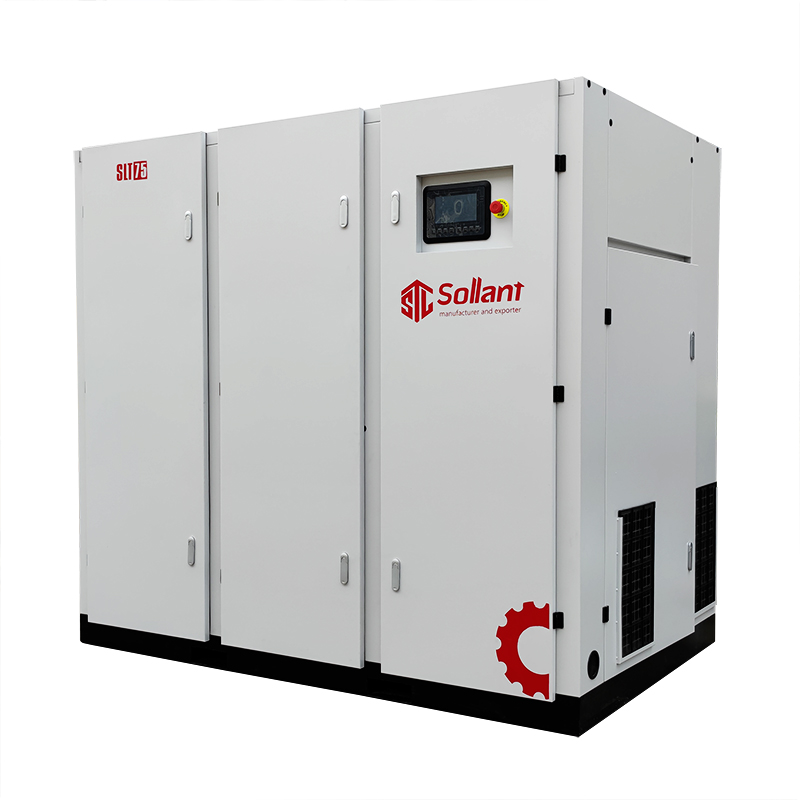
1. Introduction
Air compressors are essential machines used in various industrial, commercial, and residential applications. They convert electrical or mechanical energy into compressed air, which is then used to power tools, equipment, or to serve other purposes. Traditional air compressors use oil to lubricate their moving parts, which can sometimes lead to contamination of the compressed air.
In contrast, oil-free air compressors, as the name suggests, operate without the use of oil in the compression process, ensuring that the compressed air produced remains free of contaminants. This makes oil-free air compressors particularly valuable in industries where air purity is critical, such as pharmaceuticals, food processing, and electronics manufacturing. This article will explore how oil-free air compressors work, their types, advantages, and applications, and provide insights into how to select the right oil-free compressor for specific needs.
2. How Oil-Free Air Compressors Work
Oil-free air compressors differ significantly from traditional oil-lubricated compressors. In a typical oil-lubricated compressor, oil is used to lubricate the moving components such as pistons and cylinders, ensuring smooth operation. However, the downside is that some of the oil may mix with the compressed air, which can contaminate the air supply.
Oil-free air compressors, on the other hand, are designed without the need for oil in the compression process. These compressors use advanced materials such as Teflon seals or carbon coatings that provide natural lubrication and reduce wear and tear on components. The design of oil-free compressors ensures that there is no risk of oil contamination in the compressed air, making them ideal for applications requiring high purity air.
Key components in an oil-free air compressor include:
- Cylinders: The compressor’s cylinders are designed to prevent oil leaks, utilizing advanced seals and coatings to ensure smooth movement without the need for lubrication.
- Pistons: Oil-free pistons are designed with special coatings that reduce friction and wear, ensuring longevity without the need for oil.
- Sealing Systems: Advanced sealing systems are critical in preventing air leakage and contamination.
By eliminating the need for oil in the compression process, oil-free air compressors provide clean and dry air, making them an essential choice in industries where air quality standards are stringent.
3. Types of Oil-Free Air Compressors
Oil-free air compressors come in several types, each suited for different applications depending on the required flow rate, pressure, and energy efficiency. The most common types include:
- Screw-type Oil-Free Compressors: Screw-type compressors are the most common type of oil-free compressors used in industrial applications. They use two interlocking screws to compress air, and the design ensures minimal friction without the need for lubrication. Screw-type oil-free compressors are known for their high efficiency, durability, and ability to deliver a continuous air supply. They are often used in industries that require large volumes of air, such as manufacturing, automotive, and construction.
- Piston-type Oil-Free Compressors: Piston compressors use a reciprocating motion to compress air. In the case of oil-free piston compressors, special coatings or materials are used to reduce friction and ensure a clean, oil-free output. These compressors are often used for small to medium-scale applications where lower flow rates and pressures are required. They are ideal for industries such as dental practices, laboratories, and small-scale manufacturing.
- Centrifugal Oil-Free Compressors: Centrifugal compressors use high-speed rotating impellers to compress air, making them suitable for large-scale operations with high air demand. These compressors are highly efficient and can operate continuously without the need for oil lubrication. They are typically used in large-scale industrial settings, such as power plants, oil refineries, and chemical processing plants.
4. Advantages of Oil-Free Air Compressors
Oil-free air compressors offer numerous advantages over traditional oil-lubricated compressors, particularly in applications where air purity, environmental impact, and maintenance costs are critical considerations. Here are some of the key benefits:
- Air Purity: One of the biggest advantages of oil-free air compressors is their ability to deliver clean, uncontaminated air. Since there is no oil in the compression process, there is no risk of oil contamination, which is especially important in industries like food processing, pharmaceuticals, and electronics manufacturing, where contamination can have serious health or operational consequences.
- Lower Maintenance Costs: Without the need for oil lubrication, oil-free compressors have fewer maintenance requirements. There is no need to change oil regularly or replace filters, which can result in significant cost savings over time. The reduced maintenance also leads to less downtime, improving overall productivity.
- Environmental Friendliness: Oil-free compressors are more environmentally friendly than their oil-lubricated counterparts. Since they do not require oil, there is no risk of oil leakage, spills, or disposal issues. This makes oil-free compressors an ideal choice for companies looking to reduce their environmental footprint and comply with stricter environmental regulations.
- Energy Efficiency: Many modern oil-free compressors are designed with energy efficiency in mind. New technologies, such as variable speed drives (VSD), help optimize energy consumption, reducing operating costs while still providing the necessary air supply. In the long run, these energy-efficient features contribute to a lower total cost of ownership.
5. Applications of Oil-Free Air Compressors
Oil-free air compressors are used in a wide variety of industries where the quality of compressed air is critical. Some of the key applications include:
- Food and Beverage Industry: In food and beverage manufacturing, maintaining air purity is essential to prevent contamination. Oil-free compressors ensure that no oil enters the food production process, meeting the strict hygiene and safety standards of the industry.
- Pharmaceutical Industry: In the pharmaceutical industry, oil-free air compressors are used to provide clean air for packaging, processing, and other manufacturing processes. Since the air must be free of contaminants, oil-free compressors help meet the stringent cleanliness requirements of the industry.
- Electronics Manufacturing: Electronics components, such as semiconductors and circuit boards, are sensitive to oil contamination. Oil-free compressors are used to ensure that the compressed air remains clean and free of contaminants, preventing damage to sensitive equipment.
- Hospitals and Medical Equipment: Medical facilities use oil-free air compressors to ensure a supply of clean, non-contaminated air for various applications, including patient care, surgical tools, and medical devices.
6. Factors to Consider When Purchasing an Oil-Free Air Compressor
When selecting an oil-free air compressor, there are several key factors to consider:
- Capacity Requirements: Depending on the size of your operation and the volume of air needed, you should choose a compressor with the right capacity. A compressor that is too small will not meet air demand, while one that is too large may lead to unnecessary energy consumption.
- Pressure Requirements: Different applications require different pressures. Ensure that the compressor you choose meets the required pressure specifications for your application, whether it’s for low-pressure tasks or high-pressure industrial applications.
- Energy Efficiency: Given the continuous operation of compressors, energy efficiency is a critical factor in reducing operating costs. Look for compressors that feature energy-saving technologies such as variable speed drives.
- Maintenance and Care: While oil-free compressors generally require less maintenance than oil-lubricated models, regular care and maintenance are still essential for ensuring long-term reliability. Consider the maintenance requirements of each model and choose one that aligns with your needs.
7. Future Trends of Oil-Free Air Compressors
Oil-free air compressors are evolving with technological advancements, making them more efficient and sustainable. Some key trends include:
- Smart Control: The integration of IoT (Internet of Things) technology allows for remote monitoring and control of oil-free compressors. This provides users with real-time data on performance, energy consumption, and maintenance needs.
- Energy-Saving Innovations: With increasing pressure to reduce energy consumption, manufacturers are developing more energy-efficient compressors. Innovations such as advanced cooling systems, variable speed drives, and improved compression technology help lower energy costs while maintaining high performance.
- Green Standards: As environmental regulations continue to tighten, oil-free compressors are increasingly being designed to meet stricter environmental standards. This includes minimizing carbon footprints, reducing energy usage, and eliminating the need for oil.
8. Conclusion
Oil-free air compressors provide significant advantages in terms of air purity, cost savings, environmental impact, and energy efficiency. They are essential in industries where clean, uncontaminated air is required, and their growing adoption across various sectors reflects the increasing demand for higher quality and sustainability. As technology advances, oil-free compressors will continue to evolve, becoming even more energy-efficient, environmentally friendly, and smart, ensuring their role as a key component in modern industrial operations.


